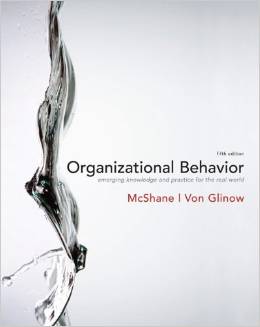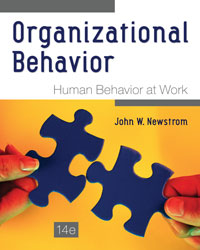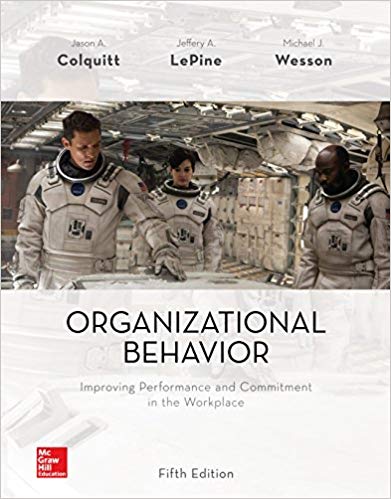
Organizational Behavior Human Behavior at Work John Newstrom 14th Edition – Test Bank
$25.00 Original price was: $25.00.$22.00Current price is: $22.00.
Edition: 14th Edition
Format: Downloadable ZIP File
Resource Type: Test Bank
Duration: Unlimited downloads
Delivery: Instant Download
Organizational Behavior Human Behavior at Work John Newstrom 14th Edition – Test Bank
Chapter 5
Motivation
True/False Questions
1. Motivation originates from within an individual.
Ans: True
Page: 116
Difficulty: Easy
2. High expectations sometimes make it difficult for achievement-oriented managers to delegate effectively.
Ans: True
Page: 118-119
Difficulty: Medium
3. People with power motives work better when they are complimented for their favorable attitudes and cooperation.
Ans: False
Feedback: People with affiliation motives work better when they are complimented for their favorable attitudes and cooperation.
Page: 119
Difficulty: Medium
4. Managers with strong needs for affiliation are always the most effective.
Ans: False
Feedback: Managers with strong needs for affiliation may have difficulty being effective managers.
Page: 119
Difficulty: Medium
5. Power-motivated people make excellent managers if their drives are for personal power rather than institutional power.
Ans: False
Feedback: Power-motivated people make excellent managers if their drives are for institutional power instead of personal power.
Page: 119
Difficulty: Medium
6. The theories of Maslow, Herzberg, and Alderfer build on the distinction between primary and secondary needs.
Ans: True
Page: 121
Difficulty: Easy
7. Giving more of the same reward can have a diminishing impact on motivation.
Ans: True
Page: 122
Difficulty: Medium
8. According to Maslow’s hierarchy of needs, the lower-order needs do not have to be satisfied for employees to move on to the high-order needs.
Ans: False
Feedback: According to Maslow’s hierarchy of needs, unless the two lower-order needs (physiological and security) are basically satisfied, employees will not be greatly concerned with higher-order needs.
Page: 122
Difficulty: Medium
9. Herzberg’s theory of motivation is universally applicable.
Ans: False
Feedback: The Herzberg model is not universally applicable, because it was based on and applies best to managerial, professional, and upper-level white-collar employees.
Page: 124
Difficulty: Medium
10. According to Alderfer’s E-R-G model, pay, physical working conditions, and job security can all address growth needs.
Ans: False
Feedback: According to Alderfer’s E-R-G model, pay, physical working conditions, and job security can all address existence needs.
Page: 124
Difficulty: Medium
11. Content theories argue that external consequences tend to determine behavior.
Ans: False
Feedback: Whereas content theories argue that internal needs lead to behavior, OB Mod states that external consequences tend to determine behavior.
Page: 125
Difficulty: Medium
12. Negative reinforcement occurs when behavior is accompanied by removal of an unfavorable consequence.
Ans: True
Page: 127
Difficulty: Easy
13. Continuous reinforcement may be desirable in some instances to encourage quick learning.
Ans: True
Page: 128
Difficulty: Easy
14. Learning is slower with continuous reinforcement than with partial reinforcement.
Ans: False
Feedback: Learning is slower with partial reinforcement than with continuous reinforcement.
Page: 128
Difficulty: Medium
15. Self-efficacy can be judged either on a specific task or across a variety of performance duties.
Ans: True
Page: 129
Difficulty: Easy
16. Self-generated feedback has little motivational value.
Ans: False
Feedback: Performance feedback tends to encourage better job performance, and self-generated feedback is an especially powerful motivational tool.
Page: 131
Difficulty: Medium
17. Instrumentality refers to the strength of a person’s preference for receiving a reward.
Ans: False
Feedback: Instrumentality represents the employee’s belief that a reward will be received once the task is accomplished.
Page: 133
Difficulty: Easy
18. If both expectancy and instrumentality are low, then motivation will be weak even if the reward has high valence.
Ans: True
Page: 133
Difficulty: Medium


MAECENAS IACULIS
Vestibulum curae torquent diam diam commodo parturient penatibus nunc dui adipiscing convallis bulum parturient suspendisse parturient a.Parturient in parturient scelerisque nibh lectus quam a natoque adipiscing a vestibulum hendrerit et pharetra fames nunc natoque dui.
ADIPISCING CONVALLIS BULUM
- Vestibulum penatibus nunc dui adipiscing convallis bulum parturient suspendisse.
- Abitur parturient praesent lectus quam a natoque adipiscing a vestibulum hendre.
- Diam parturient dictumst parturient scelerisque nibh lectus.
Scelerisque adipiscing bibendum sem vestibulum et in a a a purus lectus faucibus lobortis tincidunt purus lectus nisl class eros.Condimentum a et ullamcorper dictumst mus et tristique elementum nam inceptos hac parturient scelerisque vestibulum amet elit ut volutpat.












Reviews
There are no reviews yet.